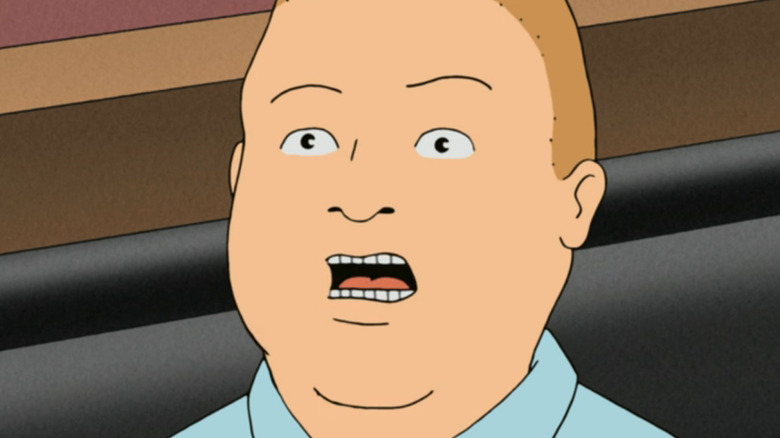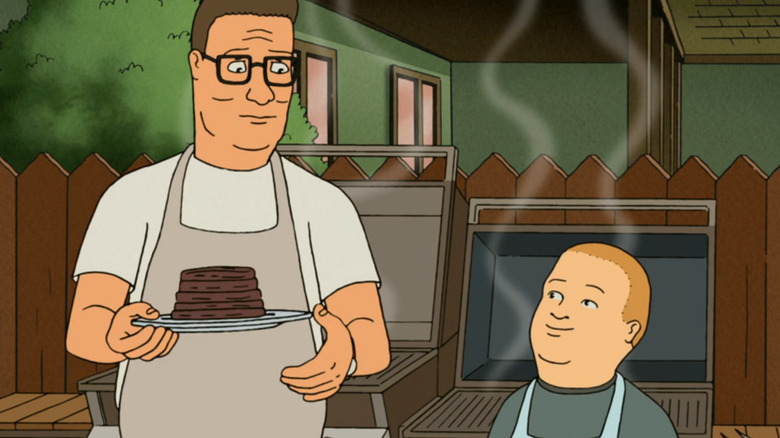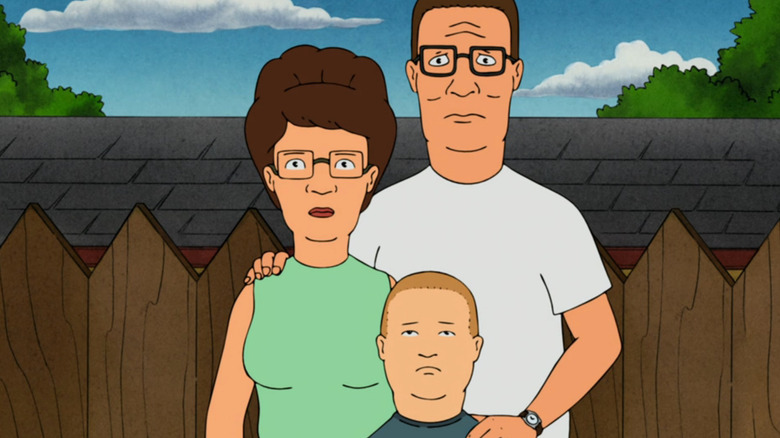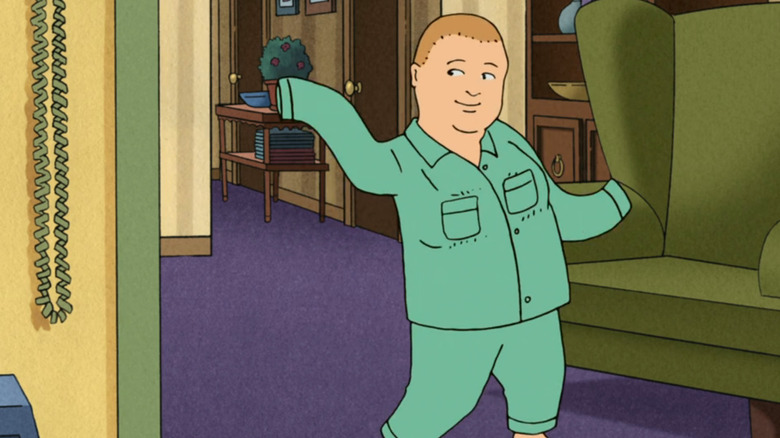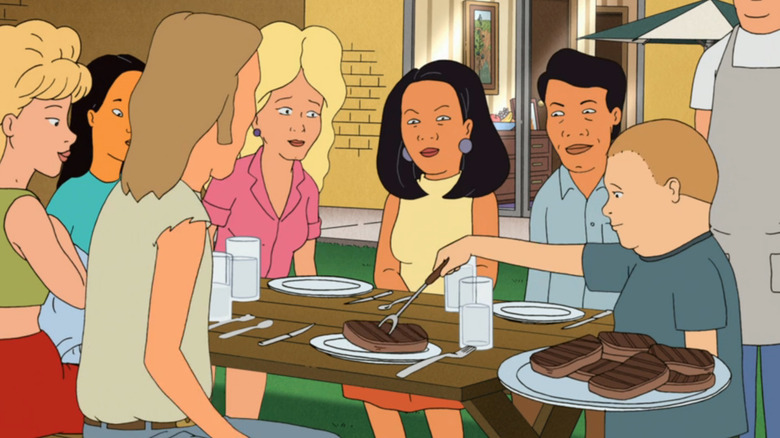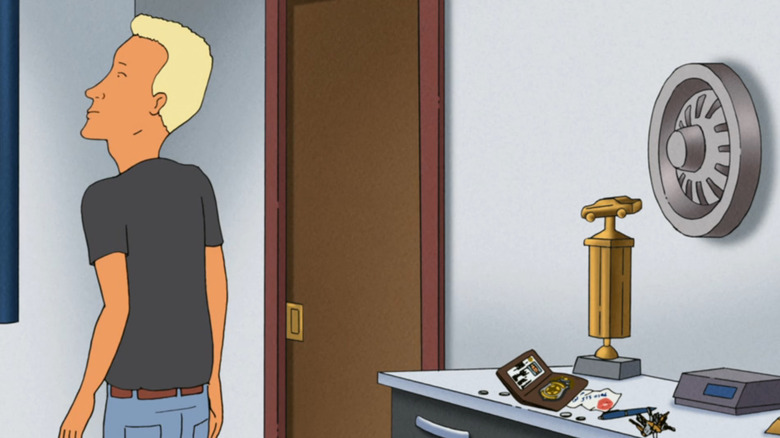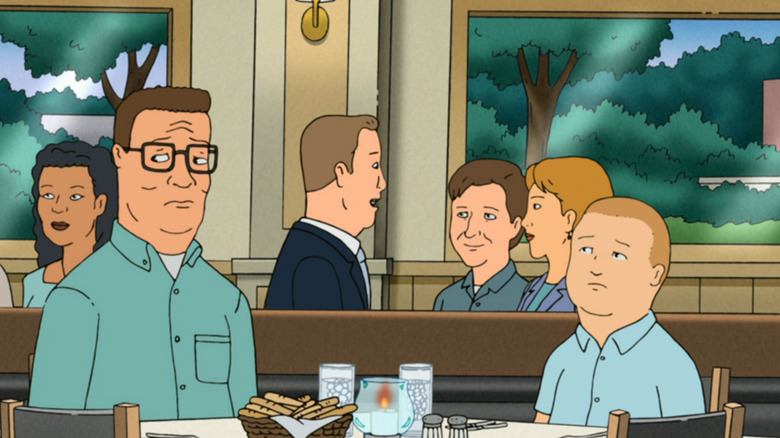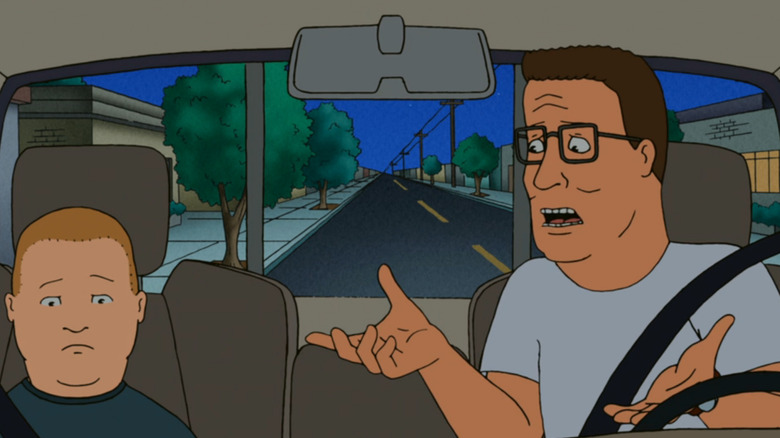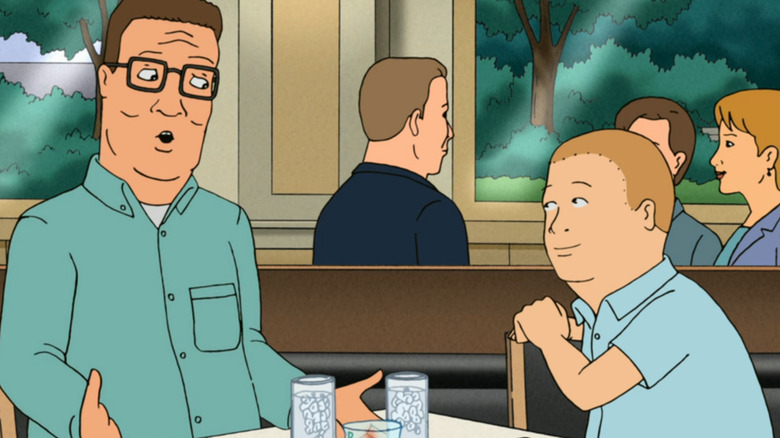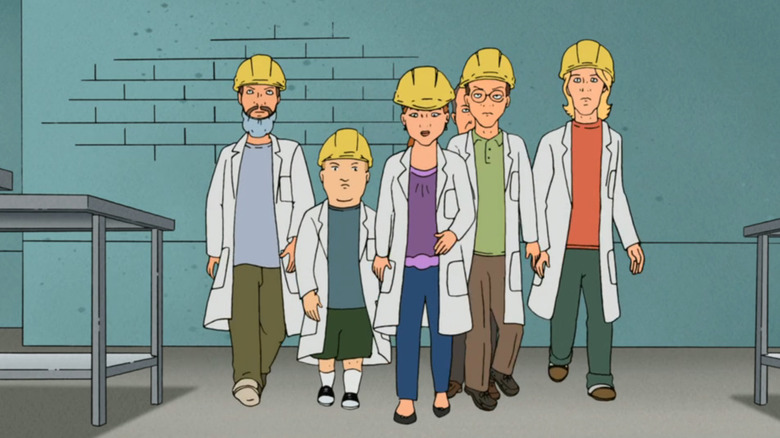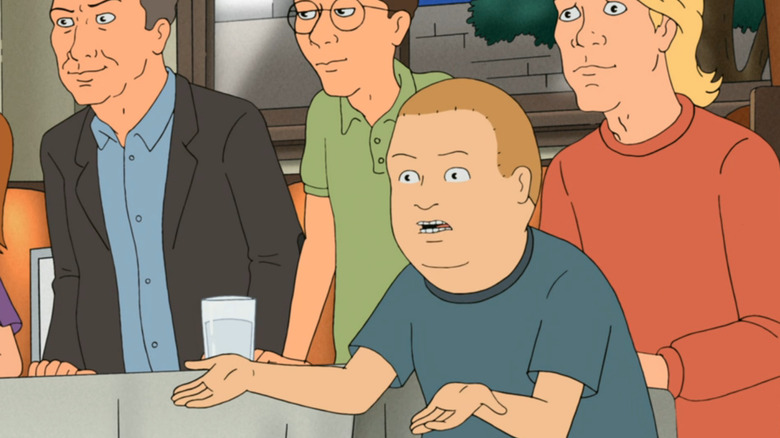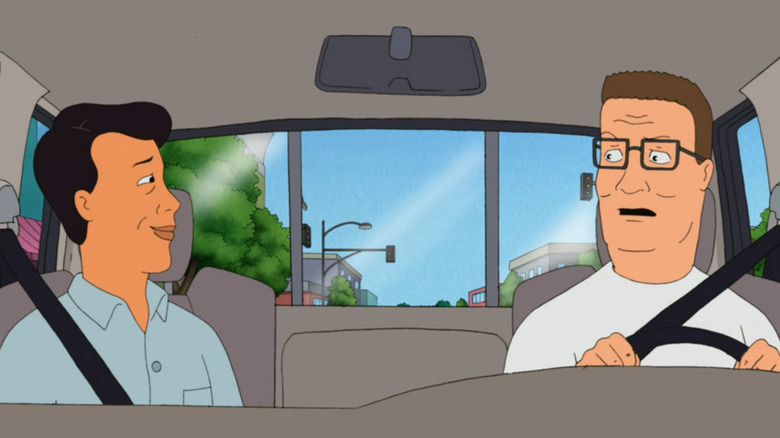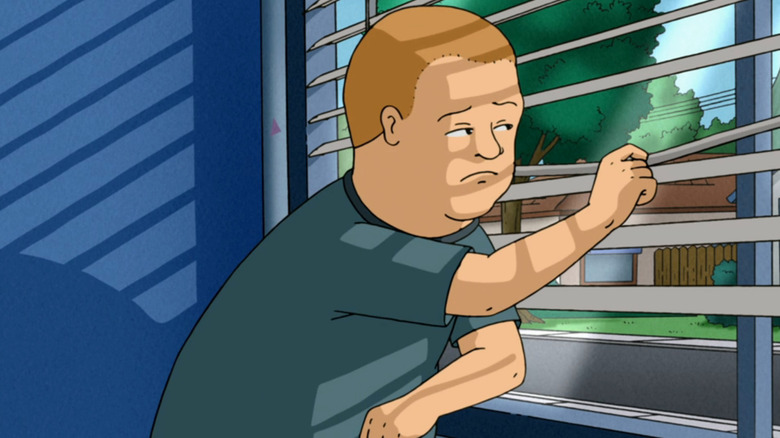The Ending Of King Of The Hill Explained
After creating '90s touchstone "Beavis and Butt-Head" for MTV in the 1990s, Mike Judge teamed with former "Simpsons" writer Greg Daniels to bring "King of the Hill" to Fox. Taking the Tom Anderson character from "Beavis and Butt-Head" and giving him a slightly more complex inner world provided a foundation for the show. The series introduced audiences to a new and improved Anderson in the form of Hank Hill, a seller of "propane and propane accessories" living in the fictional town of Arlen, Texas with his family, including his wife Peggy, son Bobby, and an ensemble of neighbors.
Clocking in at 13 seasons, "King of the Hill" is a slice-of-life story that stood out among sitcoms of its time by being unashamed to show the mundanity of small-town American life, while also slipping in some surprisingly subversive messages along the way. So, how did a show full of relatable family dynamics, a stellar recurring cast, fan-favorite characters, and celebrity guest appearances conclude its iconic run? In perfect "King of the Hill" fashion, of course. Rather than making a big fuss out of its final episode or attempting to tie up loose ends as so many other sitcoms have done, the series ends on a high note by simply doing what it does best — showing the loving bond between the Hills and their place as members of a larger community of neighbors and friends.
The family that grills together, stays together
Many "King of the Hill" episodes show a family beset by seemingly minor day-to-day problems that take on epic proportions. Even in their most difficult moments, though, they always choose to stand by one another regardless of the outcome. Through misunderstandings, tornados, Mega-Lo-Mart exploding, the loss of family members, and more, the Hills are a seriously tight-knit group. The bond they share is exemplified by the way Hank's job working with propane and his status as a neighborhood grill master and meat enthusiast rub off on Peggy and Bobby.
Though the episode "To Sirloin with Love" is technically not the final episode of "King of the Hill" (more on that later), it's hard to imagine a more fitting end to the series. Excited beyond words by Bobby's knowledge of and interest in meat cuts, Hank is so moved that he's discovered something they can talk about together that his excitement permeates the entire episode. The story features touching imagery of a proud Hank buying Bobby his own mini-grill so that they can feed the neighborhood together, assuring him that he has the rest of his days to perfect his technique as the two beam admiringly at one another. Even though Hank and Bobby don't always see eye to eye, their shared love of grilling can always bring them back together.
One of the best-written shows on the air
"King of the Hill" holds up due in no small part to its forgiving attitude toward the peculiarities of its characters. The show makes no bones about their shortcomings, but it always gives them space to grow. Much of the series was based on personalities from Mike Judge's childhood, giving the whole show a sense of down-to-earth realism that was rare in comedies of its time (per IGN). Jokes that would have quickly descended into cheap shots in most other sitcoms have a way of instead disarming themselves over the course of episodes. Though never afraid to poke fun at the over-the-top traits of its ensemble, the series almost always leads with a message of acceptance.
Beyond that, Hank Hill's family and friends feel like people you might meet at the grocery store or at a company picnic, offering a kind view of them via an extra insight into their inner worlds. The relationship between Peggy and Hank is impressively committed and supportive, and any apprehension they feel around Bobby's outlandish interests and decisions is outweighed by their desire to let him express himself. Though there are occasional slow episodes or jokes that don't land, the cleverness of "King of the Hill" often lies in its refusal to pretend to be anything but what it is, while also allowing what it is to be more complex than audiences might guess at first.
The series almost ended earlier
After such a lengthy run, it's perhaps more surprising that "King of the Hill" lasted as long as it did than it is that it was canceled in Season 13. According to Mike Judge, the series was basically canceled in 2005, only for Fox to surprise the crew by ordering more episodes (per The Chicago Tribune). The episode originally intended to close out the series was Season 11's "Lucky's Wedding Suit," the episode that sees Lucky and Luanne married after a while subplot with a frivolous lawsuit. However, the show was renewed yet again, making the episode simply the Season 11 finale.
By the time "King of the Hill" was actually canceled, the show had faced death several times (per TV Week). "To Sirloin With Love" was intended to be the final episode, but four others shot during the original run that never aired were tagged on after the fact. Though the abrupt end may have disappointed viewers, Judge seemed fine with it, noting to The Chicago Tribune that "I'd rather stop when it's still decent, rather than run it to the ground. There's also something impressive in the tenacity of a show that repeatedly survives the chopping block just by being as good as "King of the Hill" is.
Bringing the community together
Even some of the most popular sitcoms in TV history have been criticized for having less than satisfying conclusions, but "To Sirloin with Love" grants fans a fulfilling final note by showing the sincere sense of support and community that surrounds the Hills. With Peggy spending most of the episode off doing her own thing and Hank and Bobby going through a whole emotional arc with one another, "King of the Hill" evades the standard feelings of emptiness and lack of direction that many finales suffer from. The episode shows the family at their absolute best, through the eyes of their friends and loved ones.
The charm of the "King of the Hill" conclusion is that it feels just like any other episode, but one that just happens to absolutely knock it out of the park by hitting on many of the show's recurring themes. Though the early parts of the episode feature some of the best Hank and Bobby dialogue in the whole series, the concluding shots take it a bit easier by mostly allowing the pictures to do the talking. Scenes of the whole neighborhood coming out of their homes one by one to enjoy a well-cooked meal together tie together a show that, even in its roughest moments, is truly about the transformative power of loving your neighbors for who they are.
Boomhauer is a fed?
Among Hank Hill's beer-drinking buddies, Boomhauer is always the most mysterious one, with his slurred, rapid-fire way of talking making it nearly impossible to understand him even when he does choose to let his guard down. Initially one-dimensional, Boomhauer is often defined by his interest in muscle cars and women, though his luck with both is regularly called into question when the series starts unpacking the details of his life. Yet, Boomhauer is highly astute and capable of giving calm and reasonable advice to others, making him a helpful guy to have around. By the end of the series, Boomhauer gets a few spotlight episodes and even some fairly profound moments with characters like Bobby and Hank.
After spending the whole series never actually stating what his job is, the last episodes tell us that Hank's bestie Boomhauer was really a Texas Ranger the whole time. This revelation occurs in a casual scene in which Boomhauer smells the grill outdoors and leaves his home to join in the festivities. His wallet pops open, revealing his badge and solving one of the show's greatest mysteries in a perfectly low-key fashion. Does this mean that Boomhauer was casually spying on anti-government conspiracy theorist Dale throughout their friendship? We may never know.
Hank and Bobby
The dynamic between a conservative father and his much more free-spirited son makes up much of the central focus of "King of the Hill," so it might not be a huge surprise that the finale takes their relationship as its central focus. Over the course of the series, the two have their bond challenged in many ways. But even without outside instability pushing things to a head, there's the simple problem that the two just don't have that much in common. While the show often sees them making peace with their differences, "To Sirloin with Love" brings a surprising twist by simply giving them a shared interest.
When Peggy announces that she'll be off with friends for the night, Hank is concerned, noting that he and Bobby don't have all that much they can talk about without her there to act as a buffer. Yet, they connect when Bobby correctly identifies a flaw in the steak on his plate, showing Hank that he is a top-notch purveyor of meats. A man at a nearby table agrees, introducing himself as the coach of the Heimlich County Junior College meat examination team, which he asks Bobby to join. When Bobby asks his dad's opinion, Hank is so overwhelmed with joy that he immediately agrees. Just like that, Bobby's on the team, and Hank has never been happier.
You don't always have to understand the people you love
Keeping in step with the core format of "King of the Hill," Bobby soon experiences doubts about the team his father is so overjoyed to see him become a part of. Though Bobby proves himself a skilled grader by calling a number of details in a side of beef that his teammates don't immediately see, he clocks them as being a little weird right off the bat. When they go out the night before they're meant to compete, they tell Bobby he can't jinx them by eating meat before the event. After that, they throw red pepper flakes in the faces of their competitors, shocking Bobby. However, his coach encourages this behavior, causing Bobby to question his involvement in the group.
When Bobby makes a simple mistake and the others deride and ostracize him, he tells Hank he has to quit the team. This causes Hank to overreact, as he was so excited to finally bond with Bobby. This isn't so much about the competition as it is about their relationship — a point that's driven home when Bobby sees the grill his dad has bought for him in celebration. Peggy tells him in no uncertain terms that Hank's disappointment is due only to the happiness he felt when he realized that he could finally share an important part of his life with Bobby.
But you should trust them anyway
Even though Hank's feelings of sadness around Bobby's desire to quit the meat examination team are justified, Bobby has every right to leave the strange group. The shady tactics they resort to in order to claim a win are only the tip of the iceberg. Interactions with the others show Bobby that there's something deeply weird about every one of the people on the team. The focus on competition over enjoyment unsettles him and plays a major role in his decision to step away, showing that Bobby himself not only has ethics but also a healthy ability to keep his ego in check.
Hank's pride in Bobby is adorable, and his stubbornness eventually wanes as he realizes just how right Bobby was about the team. Finally understanding his desire to quit, Hank learns a classic "King of the Hill" lesson, but "To Sirloin with Love" makes it easier on him than usual. He quickly realizes the error of his ways and seeks to rectify his mistakes. As the episode ends with the two of them standing side-by-side at the grill, there's a tangible feeling of growth that's hard to find in most sitcoms.
That boy IS right
Despite Hank's consistent, series-defining declaration, "that boy ain't right," Bobby is arguably the most "right" person in "King of the Hill," and he proves it in the finale. Not only does he show surprising maturity in pleading his case with the waitstaff when he realizes his steak isn't what the restaurant claims it to be, but he also makes it clear that he's a great team member, capable of working with the goals of a larger group in mind rather than grandstanding, even when he's encouraged to do so. Bobby's calm and friendly demeanor doesn't seem as special as it is until we see it contrasted with people who have such a long way to go in their own development.
If Bobby's arc had to come to a close, this was the place for it to happen. Though he was always capable of being profound beyond his years, here he's able to forgive and connect with his dad even when Hank is being a bit immature. Besides that, he puts aside his own feelings of resentment toward the team that treated him badly, stepping in where he's needed so that they're able to succeed in the competition — even though he no longer wants anything to do with it. Juggling his father's expectations, the need for personal boundaries, and his own self-interest successfully is the kind of thing that has us taking notes on how to be more like Bobby Hill.
Winning isn't everything
One of the most consistent truths in "King of the Hill" is that you should keep things above board and be honest no matter how much you want to win. That message comes back in a big way in "To Sirloin with Love." Bobby clocks the shady dynamics of the meat examination team early on, and he finds himself completely unwilling to engage in their over-the-top attempts to hurt their competitors. Though we know by now that Bobby is a good kid willing to follow his own ethics above any group dynamics, his intuition has been honed into something truly impressive by the series' conclusion.
This episode is far from the only competition-gone-wrong to appear on "King of the Hill," but it is one of the most revealing for its characters. The added stress on Bobby to do well with the team so his father will continue to be proud of him is extreme, but even despite Hank's disappointment, there's no question that he truly loves his son. Earlier in the episode, when Bobby gets upset with himself for only getting fourth place and his team turns on him, Hank is overjoyed, celebrating his fourth-place slot with a level of enthusiasm that can't help but be endearing. The knowledge that Hank doesn't care whether Bobby succeeds — only that they have a common interest — only pushes forward the enduring message of fair play that pops up so often throughout the series.
Technically the last episode
"To Sirloin with Love" acts as the finale of "King of the Hill," but it wasn't the last episode to actually air. Four more episodes that had already been produced premiered in syndication after the fact: "The Honeymooners," "Bill Gathers Moss," "When Joseph Met Lori, and Made Out with Her in the Janitor's Closet," and "Just Another Manic Kahn-Day." These are all more ordinary episodes that don't work as well as finales as "To Sirloin with Love," but that doesn't mean they aren't still fun to watch. Hank's mother springs her announcement to remarry to a man Hank hasn't even met, Bill decides to combat his depression by getting some roommates, and Joseph's love life picks up steam.
In "Just Another Manic Kahn-Day," the actual last episode to air, the often combative relationship between Hank and his neighbor Kahn gains new dimension as the two spend some one-on-one time with each other. With Minh and Connie on a trip, Hank is tasked with checking in on his neighbor. Deciding he doesn't need his medication, Hank tells Kahn to skip it, which sends Kahn into a manic episode in which he becomes upbeat and willing to work endlessly on a shared grill project with Hank. However, Hank soon realizes he misunderstood the extent of Kahn's bipolar disorder — which is what he needs the medication for — when Kahn hits a low point and is unable to complete the project. Though Hank doesn't always behave great, he and Kahn become closer due to their newfound understanding.
The end may not be the end
To all good things, there must be an end. Even though "King of the Hill" has an inordinately great conclusion, it can still feel bittersweet to fans who wanted another 13 seasons. If that's you, you may be in luck, as there have been recent rumors of a revival series coming from original co-creators Mike Judge and Greg Daniels in the near future. Though very little information has been released to date around what we could expect from a return to Arlen, chances are it would involve quite a lot of talk of propane and propane accessories, and we wouldn't want it any other way.
In January of 2022, Daniels told Collider that his and Judge's idea for a revival would start with a time jump, aging up the show's characters significantly. However, it's still unclear if the revival will actually happen. In September of 2022, it was announced that Fox was uninterested in bringing the series back, leaving Judge and Daniels without a definite place to make the revival happen (per The Hollywood Reporter). The "King of the Hill" reboot could still be coming, however, and Judge and Daniels seem excited to bring it to life. Spending years with Hank, Peggy, and Bobby Hill was a formative experience for a lot of sitcom fans, so here's hoping the new series will be every bit the low-key slice-of-life we've come to know and love.
